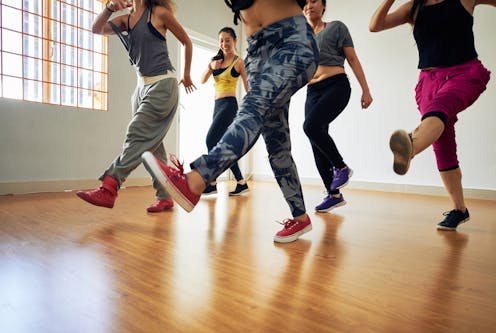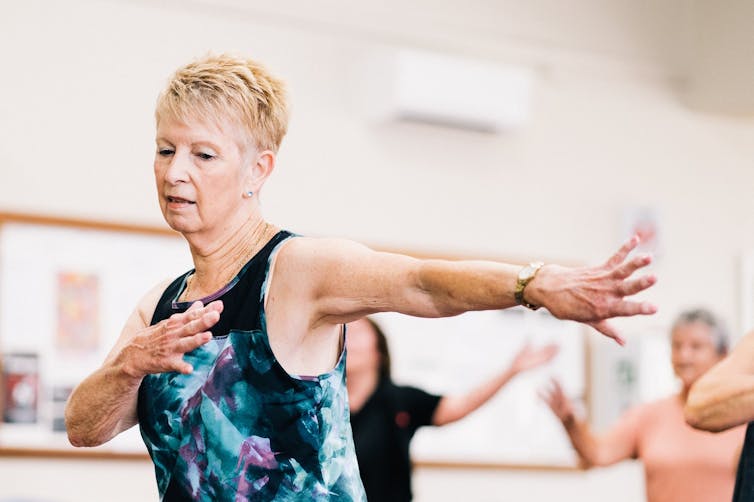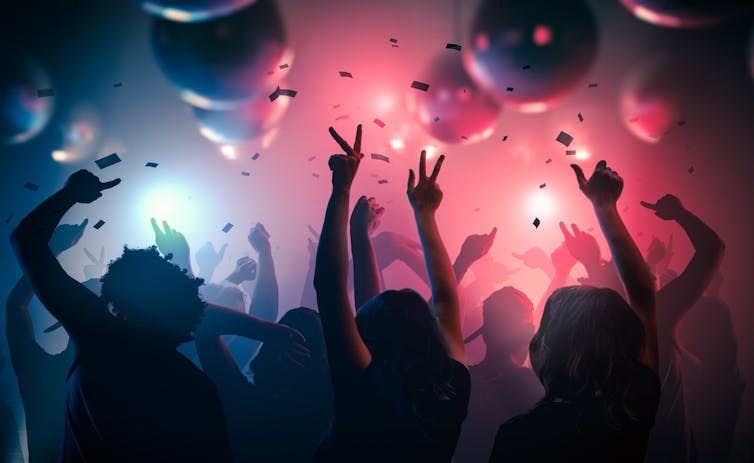Source: The Conversation (Au and NZ) – By Tamara Borovica, Research assistant and early career researcher, Critical Mental Health research group, RMIT University

If your new year’s resolutions include getting healthier, exercising more and lifting your mood, dance might be for you.
By dance, we don’t mean watching other people dance on TikTok, as much fun as this can be. We mean taking a dance class, or even better, a few.
A growing body of research shows the benefits of dance, regardless of the type (for example, classes or social dancing) or the style (hip hop, ballroom, ballet). Dance boosts our wellbeing as it improves our emotional and physical health, makes us feel less stressed and more socially connected.
Here’s what to consider if you think dance might be for you.
Read more:
Rhythm on the brain, and why we can’t stop dancing
The benefits of dance
Dance is an engaging and fun way of exercising, learning and meeting people. A review of the evidence shows taking part in dance classes or dancing socially improves your health and wellbeing regardless of your age, gender or fitness.
Another review focuses more specifically on benefits of dance across the lifespan. It shows dance classes and dancing socially at any age improves participants’ sense of self, confidence and creativity.

Wellness Gallery Catalyst Foundation/Pexels
Researchers have also looked at specific dance programs.
One UK-based dance program for young people aged 14 shows one class a week for three months increased students’ fitness level and self-esteem. This was due to a combination of factors including physical exercise, a stimulating learning environment, positive engagement with peers, and creativity.
Another community-based program for adults in hospital shows weekly dance sessions led to positive feelings, enriches social engagement and reduced stress related to being in hospital.
If you want to know how much dance is needed to develop some of these positive effects, we have good news for you.
A useful hint comes from a study that looked exactly at how much creative or arts engagement is needed for good mental health – 100 or more hours a year, or two or more hours a week, in most cases.
Dance is social
But dance is more than physical activity. It is also a community ritual. Humans have always danced. We still do so to mark and celebrate transitory periods in life. Think of how weddings prompt non-dancers to move rhythmically to music. Some cultures dance to celebrate childbirth. Many dance to celebrate religious and cultural holidays.
This is what inspired French sociologist Emile Durkheim (1858-1917) to explore how dance affects societies and cultures.
Durkheim saw collective dance as a societal glue – a social practice that cultivates what he called “collective effervescence”, a feeling of dynamism, vitality and community.
He observed how dance held cultures together by creating communal feelings that were difficult to cultivate otherwise, for example a feeling of uplifting togetherness or powerful unity.
It’s that uplifting feeling you might experience when dancing at a concert and even for a brief moment forgetting yourself while moving in synchrony with the rest of the crowd.

Shutterstock
Synchronous collective activities, such as dance, provide a pleasurable way to foster social bonding. This is due to feelings Durkheim noticed that we now know as transcendental emotions – such as joy, awe and temporary dissolution of a sense of self (“losing yourself”). These can lead to feeling a part of something bigger than ourselves and help us experience social connectedness.
For those of us still experiencing social anxiety or feelings of loneliness due to the COVID pandemic, dance can be a way of (re)building social connections and belonging.
Whether you join an online dance program and invite a few friends, go to an in-person dance class, or go to a concert or dance club, dance can give temporary respite from the everyday and help lift your mood.
Read more:
Are you part of a social group? Making sure you are will improve your health
Keen to try out dance?
Here’s what to consider:
-
if you have not exercised for a while, start with a program tailored to beginners or the specific fitness level that suits you
-
if you have physical injuries, check in with your GP first
-
if public dance classes are unappealing, consider joining an online dance program, or going to a dance-friendly venue or concert
-
to make the most of social aspect of dance, invite your friends and family to join you
-
social dance classes are a better choice for meeting new people
-
beginner performance dance classes will improve your physical health, dance skills and self-esteem
-
most importantly, remember, it is not so much about how good your dancing is, dance is more about joy, fun and social connectedness.
In the words of one participant in our (yet-to-be published) research on dance and wellbeing, dance for adults is a rare gateway into fun:
There’s so much joy, there’s so much play in dancing. And play isn’t always that easy to access as an adult; and yet, it’s just such a joyful experience. I feel so happy to be able to dance.
![]()
Tamara Borovica receives funding from VicHealth – Victorian Health Promotion Organisation.
Renata Kokanovic receives funding from Australian Research Council (ARC), National Health &Medical Research Council (NHMRC) and Vic Health.
– ref. Let’s dance! How dance classes can lift your mood and help boost your social life – https://theconversation.com/lets-dance-how-dance-classes-can-lift-your-mood-and-help-boost-your-social-life-197692




